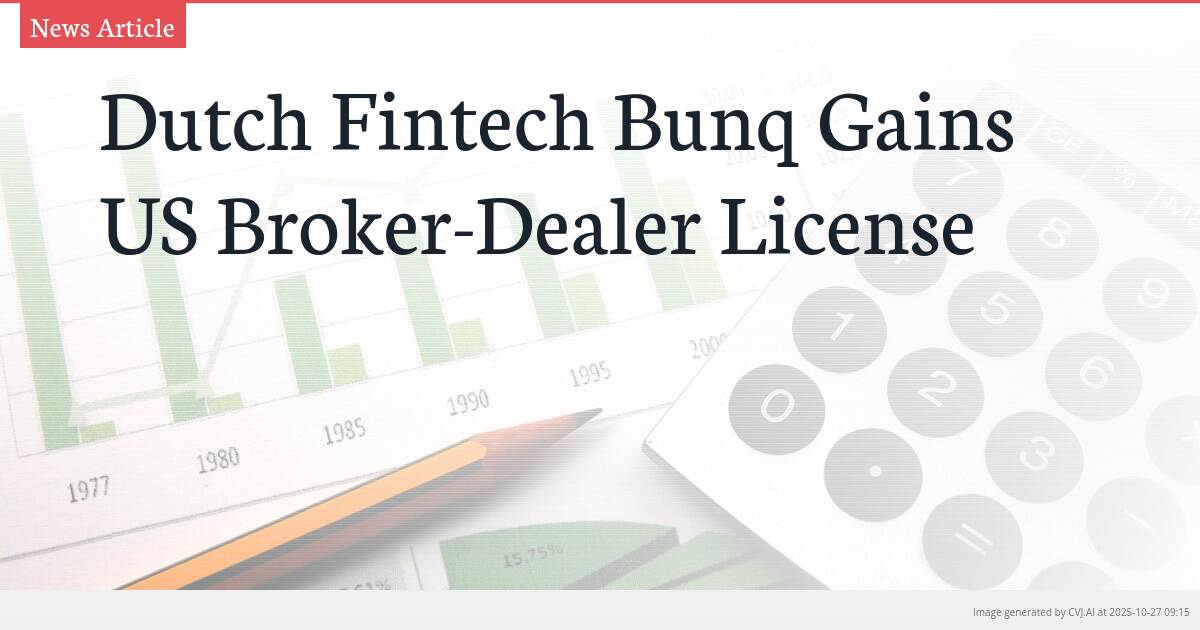This summary text is fully AI-generated and may therefore contain errors or be incomplete.
Introduction
Dutch digital banking pioneer Bunq BV has achieved a significant regulatory milestone, receiving approval from the Financial Industry Regulatory Authority (FINRA) to operate as a broker-dealer in the United States. This landmark decision, announced on Monday, enables the Amsterdam-based fintech to offer securities trading services to American customers, marking a strategic advancement in its international growth strategy beyond European markets and positioning it to compete in the world’s largest financial marketplace.
Key Points
- Bunq received approval from FINRA, Wall Street's self-regulatory organization, for its US broker-dealer license
- The license enables the Dutch fintech to offer securities trading services to American customers
- Bunq applied for the license in April 2025 as part of its international expansion strategy beyond European markets
Regulatory Breakthrough for European Fintech
The Financial Industry Regulatory Authority, Wall Street’s self-funded regulatory body, granted Bunq BV its broker-dealer license following an application process that began in April 2025. This approval represents a crucial validation for the Dutch fintech company, which has been expanding its service offerings beyond traditional banking. The license specifically authorizes Bunq to conduct securities trading operations in the United States, allowing the company to compete directly with established American financial institutions and other fintech platforms in the lucrative securities market.
This regulatory achievement comes at a time when European fintech companies are increasingly looking to international markets for growth opportunities. The United States represents the world’s largest financial market, and gaining entry through proper regulatory channels demonstrates Bunq’s commitment to compliance and strategic expansion. The approval process with FINRA, known for its rigorous standards, indicates that Bunq has met the necessary capital requirements, operational capabilities, and compliance frameworks required for broker-dealer operations in the highly regulated US financial landscape.
Strategic Expansion into US Markets
The broker-dealer license enables Bunq to offer securities trading services to American customers, significantly expanding the company’s product portfolio beyond its core banking services. This move positions Bunq to capture market share in the competitive US retail investing space, where demand for digital trading platforms continues to grow. The expansion aligns with broader trends in the financial technology sector, where traditional banking services are increasingly integrated with investment capabilities to provide comprehensive financial solutions.
Bunq’s entry into the United States market represents a strategic diversification beyond its European home base. The company, which has built its reputation on mobile-first banking services, now has the regulatory foundation to compete in securities trading against both established American brokerages and other international fintech companies that have entered the US market. This expansion comes as global fintech companies seek to leverage their technological advantages and customer-centric approaches in markets traditionally dominated by legacy financial institutions.
The timing of this regulatory approval is particularly significant given the increasing integration of banking and investment services worldwide. By securing the broker-dealer license, Bunq can now offer American customers a seamless experience that combines banking and investment services through its mobile platform, potentially disrupting traditional financial service delivery models in the United States.
Implications for Global Fintech Competition
Bunq’s successful navigation of the US regulatory landscape sets an important precedent for other European fintech companies considering American expansion. The approval demonstrates that international fintech firms can meet the stringent requirements of US financial regulators while maintaining their distinctive service models. This development may encourage additional European financial technology companies to pursue similar regulatory pathways for entering the United States market.
The broker-dealer license positions Bunq to compete in multiple currency environments, including both the Euro and US Dollar markets, enhancing its appeal to internationally-minded customers. This cross-border capability could prove particularly valuable for customers seeking integrated financial services across different geographic regions and currency denominations. The expansion also represents a significant step in the ongoing globalization of fintech services, where companies increasingly operate across multiple jurisdictions and regulatory frameworks.
As Bunq implements its US securities trading operations, the company will need to navigate the complex regulatory requirements of both the American and European financial systems. This dual regulatory compliance represents both a challenge and an opportunity for the fintech, potentially providing valuable experience that could inform future international expansion efforts. The success of Bunq’s US venture will be closely watched by industry observers as an indicator of European fintech companies’ ability to compete effectively in the sophisticated American financial marketplace.
📎 Read the original article on bloomberg.com

